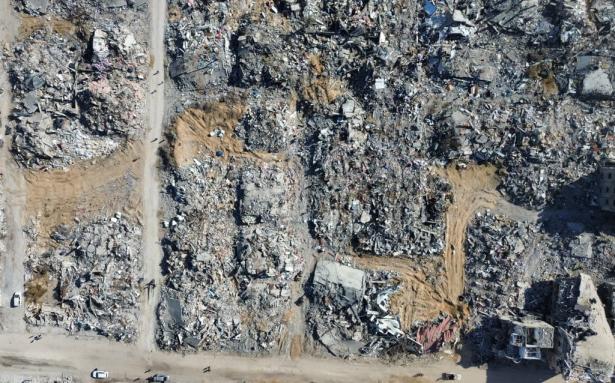On Saturday, August 2, the Israeli army withdrew from the western parts of the al-Shuja’iyya neighborhood. One of the largest neighborhoods in Gaza City, al-Shuja’iyya had an estimated population of 120,000 people. The last evacuation order for the area was in April 2025, marking the seventh invasion of the neighborhood since the war began.
As the Israeli army withdrew, people started returning to their old streets in Shuja’iyya to check on what might remain of their homes. When they arrived, nothing was there. I started to frantically look online for photos of my old neighborhood, hoping that I might recognize my home and make sure that the part of it that remained standing before the ceasefire broke is still there. The photos I saw first were from Israeli accounts, gleefully posting the images of mass destruction that their army had created in Gaza.
Then the photos started to come in from my neighbors and friends. Everything was piles of rubble.
I started calling my family members in Gaza, asking who was going back to check on our home, but they told me it was still too dangerous, and that the Israeli army is targeting people with quadcopter drones that fly over the neighborhood. I called some neighbors and friends, hoping that I would find anyone who was already there and could send me a photo to calm my nerves. As I waited, I felt like a father whose son had been lost to him.
On Monday, one of my neighbors told me he was going anyway — I couldn’t ask him to go just for me, because I would have asked him to risk going to his death. My nephew told me that Muhammad Talb, 33, had gone there, and he asked me to call him if I wanted something specific from the area.
I did and talked to him for a minute over the phone. He said that he was on his way, and I asked him to get a photo of my home. He’s been my neighbor for 33 years, from the day I was born.
One hour later, I called again, but his phone was unavailable. I considered a hundred scenarios in my head, thinking maybe he couldn’t bring himself to tell me that my home was gone. Or maybe he’s weeping over the ruins of his own home and needs to be alone. For some reason, I didn’t think that he might have been killed, even though it was the most logical thing to assume.
Hours later, my nephew told me that an Israeli drone had bombed him while he was checking on his home.
After that, I couldn’t ask anyone anything.
Nothing left standing
The next day, more videos from neighbors on social media showed up on my social media feed, but all I could see was flattened blocks and more piles of rubble. I couldn’t find a single house that remained standing. And it wasn’t just the homes — the streets were completely dug up, the trees were burned, and even empty tracts of land were bulldozed.
Ameer Shaiah, one of my neighbors, posted a few videos of our neighborhood, but nothing was recognizable. It was just rubble everywhere, from every direction. I spoke to him.
“Did you see my home?”
“It’s a pile of rubble, Tareq. Not a single home was left standing.”
I did not believe him. “Did you see my home closely?” He said he had not crossed to the side street where my home was located, but assured me that all the homes were flattened.
Another neighbor posted a video on social media. I hurried to call him, because if he reached his home, he would pass by mine and would be able to tell me about it.
“How is my home?” I asked without even greeting him.
“Put your hope for reward in God,” he said. I would not believe it until I saw it with my own eyes. I asked whether he had a photo or a video. He sent me a video saying that my house was in a part of it.
I watched it while my hands shook. The door of my home was still standing. Everything behind it was rubble.
The scene damaged parts of my soul that I had pushed back into memory. I wondered why the door was still standing and gave myself a few answers. It was still waiting for its residents to come back. It had to stay standing so that it could bear witness to all of our memories.
The same door that I hurried through every time I gave my family good news — my graduation from school, my excitement when I got a decent job, my happiness when I started a family. The same door that witnessed my evacuation in October 2023.
The door had been covered with a jasmine tree planted by my late parents. Inside that home, I had listened to hundreds of stories from my father about how he struggled to build it and how my mother helped move the stones and sand from the ground floor to the second, so that the workers could finish their job faster. My family lived on the sand for years until my father could finish building it.
In a blink, Israel destroyed a 55-year-old home, almost more than half of its age as a state, leaving me with memories that a lifetime would not be enough to make me forget.
Like the cities of Rafah and Beit Hanoun, al-Shuja’iyya no longer exists. The Israeli army is systematically leveling every part of Gaza, seeking to wipe out its very memory.
===
Tareq S. Hajjaj is the Gaza Correspondent for Mondoweiss and a member of the Palestinian Writers Union. Follow him on Twitter/X at @Tareqshajjaj.


Spread the word